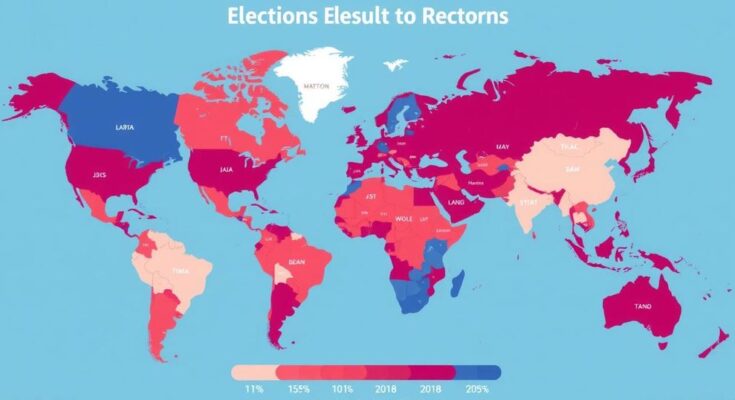In 2024, over 70 countries participated in elections affecting 4 billion people. Voter turnout averaged 61%, with Rwanda leading at 98.2% and Tunisia at 28.8%. Several incumbents retained their positions, while new leaders emerged, reflecting changing political dynamics and citizen engagement. Significant events included Modi’s coalition government in India and the end of Sheikh Hasina’s rule in Bangladesh following protests, illustrating ongoing political shifts globally.
In 2024, over 70 countries held elections, impacting around 4 billion people, nearly half of the global population. This included significant parliamentary elections within 27 European Union nations. The Indian elections saw the largest democratic exercise, with voter turnout averaging 61 percent worldwide. While Rwanda reported the highest turnout at 98.2 percent, Tunisia recorded the lowest at 28.8 percent. Numerous incumbents were re-elected, showcasing a mix of predictable and shocking outcomes, while new leaders emerged in several nations, indicating shifting political landscapes.
Among the notable results, incumbent political leaders like Narendra Modi of India, who won a third term but failed to secure a majority, and Donald Trump in the U.S., who resumed office against Kamala Harris, highlighted a shift in voter sentiment. Meanwhile, countries such as Rwanda and Uruguay witnessed overwhelming support for their leaders in an evolving landscape where concessions and alliances became necessary for governance. The election cycles also reflected ongoing protests and crises, as seen in Bangladesh and Syria, significantly shaping the new political order in these regions.
The case of Bangladesh exhibited profound changes as Sheikh Hasina resigned amid violent protests, while in Syria a long-standing regime ended after a civil war, suggesting a global trend towards challenging entrenched leadership. Nonetheless, the political atmosphere remains fraught with upheaval, dictating the need for careful analysis of the new power dynamics that have emerged following the global elections of 2024.
Overall, more than 1.7 billion individuals participated in these elections, indicating a fervent engagement in their respective political futures, as leaders navigated both the taunts of criticism against their administrations and the demands for systemic change among their constituents.
The 2024 global elections saw more than 70 nations participating, resulting in varied outcomes that showcased both the continuity and the departure from established political leadership across different regions. This significant electoral activity underscores the diversity of political systems and the increasing engagement of populations in democratic processes. The results highlighted various trends, including voter turnout rates, which varied dramatically from one location to another, illustrating the complex landscapes of political allegiance and public sentiment. The year also marked transitions in governance whereby numerous incumbents retained power while others faced unexpected defeats or were removed altogether amid civil unrest. This election cycle reflects a crucial moment for many countries grappling with internal and external pressures, as they navigate through public dissatisfaction with political elites and economic challenges. Understanding this context is essential for comprehending the shifts in power dynamics globally.
The elections of 2024 not only represented a significant exercise of democracy worldwide but also revealed the complexities underlying voter behavior and political allegiance. While some leaders maintained their positions, others faced unprecedented challenges, leading to noteworthy changes in governance. Moreover, the varied voter turnout indicated different levels of civic engagement and public sentiment across regions. As political landscapes continue to evolve, the outcomes of these elections will undoubtedly shape global dynamics and the future trajectories of nations navigating through their respective challenges.
Original Source: www.aljazeera.com




